Guilie Castillo-Oriard's Blog, page 15
January 24, 2015
Curacao up for Best Caribbean Beach!
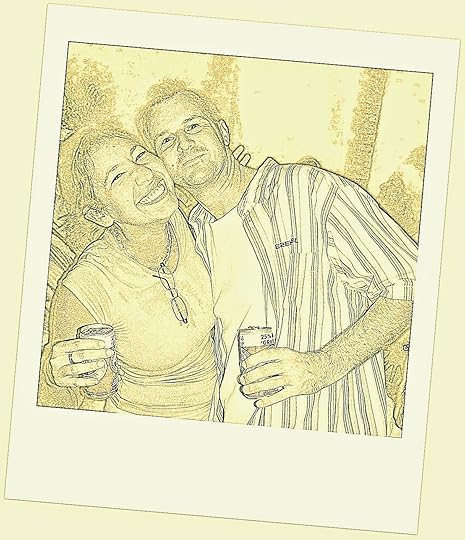 Cor and I at Seaquarium
Cor and I at SeaquariumBeach a few months after
that fateful Trafassi concertThe Seaquarium beach--aka Mambo beach--is one of Curaçao's most well-known, most-often-photographed, and probably the only one of all the island's beaches (yes, there's a lot) that every single visitor to the island goes to. It was certainly the first one I saw when I came here, so this smallish, man-made strip of sand is responsible for turning what was originally a six-month stay into a total about-face in my lifestyle that's lasted over a decade. And counting.
At this beach, one Thursday night in a long-ago October, during a Trafassi concert (in which I heard a song about "big washes, small washes" for the first time), the man that's since become my life partner and my best friend kissed me for the first time.
 My mom at Seaquarium beach on her first
My mom at Seaquarium beach on her firstvisit to Curaçao (2006)
For this, if for no other reason, no other beach will ever beat this one in my personal list of Ultra-Special Locations Of The World. But this beach is special to everyone that knows it (not just us suckers for love stories that begin on white sand).
It's got everything: beautiful, sheltered water; shade and sun and comfortable lounging chairs that spread out over several beach clubs; the coolest bars in town where everyone hangs out in wet swimming suits and sandy feet; and, perhaps above all, the loveliest view of the sunset.
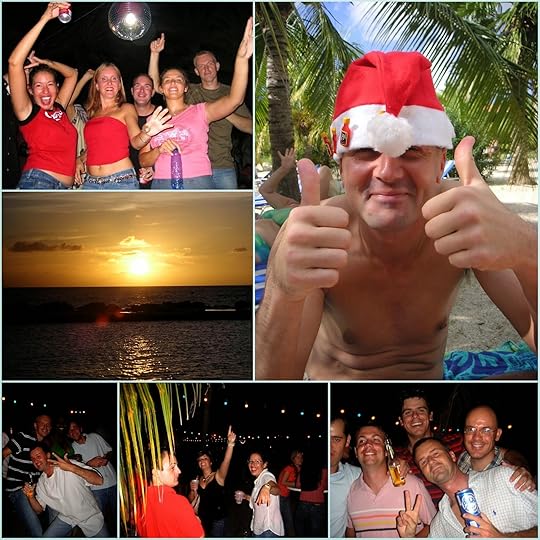
Go vote for Curaçao's Seaquarium beach as Best Caribbean Beach. Better yet, come see it for yourself ;)
Published on January 24, 2015 14:00
January 3, 2015
Lessons of 2014
1. Rhythm is the key to discipline. (Achieving that rhythm is on the list for 2015.)2. Unconditional acceptance is the most beautiful gift of love.3. Nostalgia is a powerful drug. It feels good (in a masochistic kind of way), is great as an excuse to avoid reality, is also great for writing fiction, and--because of the above?--is highly addictive. Do not exceed recommended dose. (Recommended dose still to be determined.)4. The palette of human emotion is wide. Wide, wide. There are all sorts of hues and grades that won't ever fit into a CMYK scheme.5. [Should really be 4(a)] Connections with people come in all flavors, all kinds, and--most importantly--all levels. The key: learn to identify what kind of connection you're making.6. I talk too much. No, really.7. Love the life you live. Live the life you love.8. Trite can also be true. (7a?)9. Facebook is, truly, the worst time-suck.10. For my dogs I'm prepared to make any sacrifice. I have proof.11. Love doesn't need to be returned to be real.12. No, there really is no end to love. (Thank you, U2.)
Happy 2015. May you revel in the grand beauty "beneath the chitter-chatter and the noise, silence and sentiment, emotion and fear. The haggard, inconstant flashes of beauty." (La Grande Belleza, Paolo Sorrentino, 2013. You need to see it. If you already did, let me know and let's rave about it together.)
Couldn't find a version with subtitles in English. Here's my translation of the last bit, my favorite:
Happy 2015. May you revel in the grand beauty "beneath the chitter-chatter and the noise, silence and sentiment, emotion and fear. The haggard, inconstant flashes of beauty." (La Grande Belleza, Paolo Sorrentino, 2013. You need to see it. If you already did, let me know and let's rave about it together.)
Couldn't find a version with subtitles in English. Here's my translation of the last bit, my favorite:
It always ends like this. With death. First, however, there is life, there beneath the bla bla bla bla. It's all sedimented under the chatter and the noise, silence and sentiment, emotion and fear. The sparse, inconstant flashes of beauty, and then wretched squalor and miserable humanity. All buried under the blanket of the embarrassment of being in the world. Bla, bla, bla, bla. Beyond, there's the beyond. I don't deal with the beyond. Therefore, let this novel begin. In the end, it's only a trick. Yes, it's only a trick.
Published on January 03, 2015 15:19
November 28, 2014
Saramago, Caín, The Evolution of Opinions, and The Perils of Rigidity
For a good and hefty chunk of my life, I hated Saramago. At some point I read something of his--no clue what, could've been in school, could've been in some stray book in my dad's library, could've even have been a snippet glimpsed over someone's shoulder--and, whatever it was, made enough of an impression to forge a rock-solid disdain of his work.
And (to my intense embarrassment today) I didn't hesitate to vociferate it to anyone who asked.
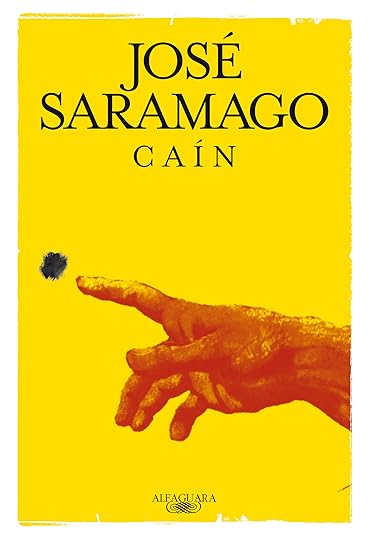 Listed in AmazonHey, says an innocent bystander. What do you think of Saramago?
Listed in AmazonHey, says an innocent bystander. What do you think of Saramago?
Guilie, in full wrath mode, retorts, He's preachy and presumptuous and arrogant and totally incompetent as a storyteller.
But, but, would stammer the poor bystander, he won a Nobel prize for literature.
And I, in all my wisdom, would just roll my eyes. What. Ever.
And then came along a friend wit a copy of Saramago's Caín. Have you read this, he says. No, I say, and before I can spit out my usual Saramago-induced vituperations, he shoves it into my hands. Here, he says. I owed you a book.
I don't read this crap seemed, given it was a gift--and a special friend, and the tail end of a pretty special evening--a tad harsh. So I smiled and did my best to sound graceful when I said thank you.
I did not intend to read it.
But... Well, like I said. Special friend. Special evening. Maybe I was predisposed for paradigm shifts. Maybe the book I was reading wasn't doing much for me. (Can't even remember which one it was, so there's that.)
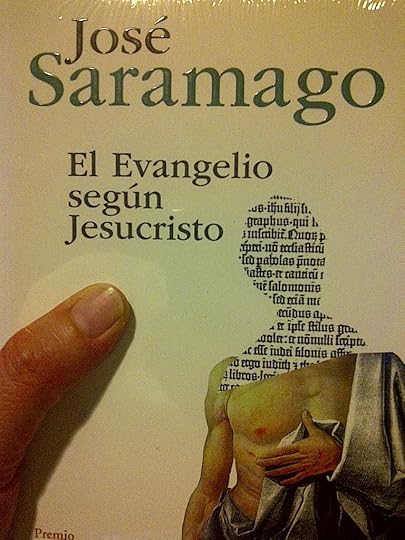 Next up on the Making-Up-For-Lost-Time
Next up on the Making-Up-For-Lost-Time
(aka the Saramago Guilt Trip)
reading list.I opened it. I began to read, expecting to last no more than a half-page before throwing the thing and all its cheery canary yellow against a wall.
I didn't put it down for the whole day, a good chunk of the night, and throughout all the waiting and sitting and standing in line of my flights back to Curaçao. I drew wary stares and realized I'd been chuckling or--worse--repeating a sentence out loud, just for the pleasure of hearing the words.
As one wades into middle age, one's convictions--beliefs, prejudices, experience-sourced knowledge--harden like the remains of a Thanksgiving dinner on silver platters left on the kitchen counter in the classic "We'll clean up tomorrow."
Caín, for me, was a much needed reminder that knowledge is only perception; that it's not the fittest but the most adaptable that survive; that there is, in fact, a lot of newness under the sun--if we care to look. To rip off the veil of prejudice and see.
Thank you, Saramago introducer. You'll be remembered with gratitude forevermore. I might've gone through life never knowing this brilliant, brilliant author. His brilliant mind.
And (to my intense embarrassment today) I didn't hesitate to vociferate it to anyone who asked.
 Listed in AmazonHey, says an innocent bystander. What do you think of Saramago?
Listed in AmazonHey, says an innocent bystander. What do you think of Saramago?Guilie, in full wrath mode, retorts, He's preachy and presumptuous and arrogant and totally incompetent as a storyteller.
But, but, would stammer the poor bystander, he won a Nobel prize for literature.
And I, in all my wisdom, would just roll my eyes. What. Ever.
And then came along a friend wit a copy of Saramago's Caín. Have you read this, he says. No, I say, and before I can spit out my usual Saramago-induced vituperations, he shoves it into my hands. Here, he says. I owed you a book.
I don't read this crap seemed, given it was a gift--and a special friend, and the tail end of a pretty special evening--a tad harsh. So I smiled and did my best to sound graceful when I said thank you.
I did not intend to read it.
But... Well, like I said. Special friend. Special evening. Maybe I was predisposed for paradigm shifts. Maybe the book I was reading wasn't doing much for me. (Can't even remember which one it was, so there's that.)
 Next up on the Making-Up-For-Lost-Time
Next up on the Making-Up-For-Lost-Time(aka the Saramago Guilt Trip)
reading list.I opened it. I began to read, expecting to last no more than a half-page before throwing the thing and all its cheery canary yellow against a wall.
I didn't put it down for the whole day, a good chunk of the night, and throughout all the waiting and sitting and standing in line of my flights back to Curaçao. I drew wary stares and realized I'd been chuckling or--worse--repeating a sentence out loud, just for the pleasure of hearing the words.
As one wades into middle age, one's convictions--beliefs, prejudices, experience-sourced knowledge--harden like the remains of a Thanksgiving dinner on silver platters left on the kitchen counter in the classic "We'll clean up tomorrow."
Caín, for me, was a much needed reminder that knowledge is only perception; that it's not the fittest but the most adaptable that survive; that there is, in fact, a lot of newness under the sun--if we care to look. To rip off the veil of prejudice and see.
Thank you, Saramago introducer. You'll be remembered with gratitude forevermore. I might've gone through life never knowing this brilliant, brilliant author. His brilliant mind.
Published on November 28, 2014 23:00
November 26, 2014
On a coolish autumn night in New York's Lower East Side...
A reading. In front of an audience--that, let it be said, contained only two friends of mine. Only two people I knew from before that night. Everyone else--and it was a pretty solid crowd--was a stranger or had been until an hour or so earlier.
 The crowd.
The crowd.
 Susan Tepper, MC (and star organizer)
Susan Tepper, MC (and star organizer)
of the 2014 A Year In Stories reading
at KGB Bar NYCHere's what happened: Susan Tepper , who's one of the other 31 authors in the 2014 A Year In Stories project , finagled a reading for the project at the KGB Bar (Lower East Side, NYC).
Okay, maybe "finagled" isn't quite the right word; she's an esteemed member of NYC's literary community, so she probably just sent an email to someone and they fell all over themselves to arrange it.
What she did do herself, and mighty effort it took, too, was to get the other authors to attend--a feat in itself, since very few authors live in the East Coast, let alone NYC itself. (I, for instance, came in all the way from Curaçao--how could I not?) The project includes authors from as far afield as Australia and Scotland and Ireland, and even an itinerant sailor now docked somewhere in the coasts of New Zealand.
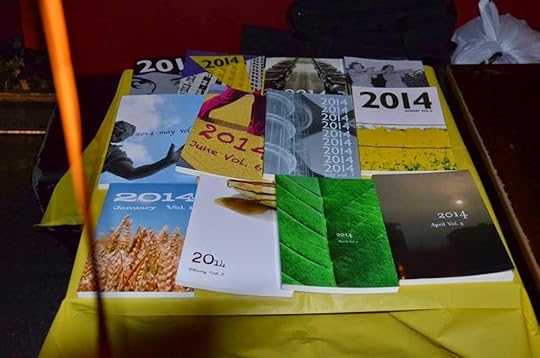 The extra copies Susan ordered, displayed to full advantage
The extra copies Susan ordered, displayed to full advantage
next to the podium. (P.S. -- they sold out.)But Susan got ten of us to attend--and not just attend but promote the event. Aside, of course, from the huge labor of marketing she did herself. She ordered extra copies of the 2014 books to have them for sale at KGB. She invited a whole bunch of Who's-Who-s in the literary scene. She--well, she was a hero. She made it all happen. Thank you, Susan, for the night of the year.
Aside from the glitziness of having a reading in a NYC literary venue (omg.omg.omg), there was the unwarranted pleasure of meeting some of the people whose stories I've been reading--and who've been reading mine--for eleven months. People who I knew only through Facebook, through photos, through blogs, through the intimacy of their writing.
 Andrew Stancek and yours truly. Yours truly is standing,
Andrew Stancek and yours truly. Yours truly is standing,
not sitting. He's *that* tall. Andrew Stancek , for instance, who wrote this fantastic series about a man who can fly. Or Kimberlee Smith , who wrote the Aussie stories about the dead woman--from the POV of a dead woman. I know, brilliant. For that series alone the whole project is worth reading. Or Teresa Burns Gunther , and her phenomenal series People Skills, about Rachel (the borderline autistic woman) and Stella (her monster-size, if not monster-tempered, dog). Or John Wentworth Chapin and his Kaleidoscope, loveliest of lovelies for magical language and a main character so real that I have dreams about him. Derek Osborne and his sad, sad tale of a man, a sailing ship, and the love he finds when he has no more time to give. Lynn Beighley and the scathing-dressed-as-hilarious tale of one woman's fall into the world of reality TV. Rachel Ambrose and Margaret Bingel , both of whom I'd pictured as middle-aged (their writing is so freakin' mature, dammit) and who might, in actuality, be my daughters. (If I'd gotten pregnant at--okay, at thirteen. Hey, it happens.)
 The readers.Everyone.
The readers.Everyone.
It was a beautiful thing. An experience to cherish until the end of time: my first public reading.
(Okay, I did have readings before, back in Mexico, back in my 20's, back before I got sucked into the vortex of Making Money and stopped writing, but they can hardly compare to a literary bar in NYC. Seriously.)
All this happened on November 5th, the evening of a more-or-less dry autumn day. I arrived in NYC the night before, really late, and left Friday morning. All in all, just over 48 hours total in the city. Was it worth the 24-hour traveling time (including layovers, 11 hours Curaçao-Miami-JFK, 12 hours JFK-Miami-Curaçao)?
Oh, yes. Yes.
For the reading alone, Yes. For the visit, however short, to a city whose streets I used to walk every weekend when we lived in NJ, and to which I hadn't been back in 30 years--Yes. For the chance to spend a few hours (a tad wine-soaked hours, too, but--hey, we were celebrating) with my absolute best friend from 30 years ago-YES.
This has been a year of many interesting encounters, of doors opening, of discovery, of growth, of humility... And of nostalgia. First Cuernavaca, then NYC. It's a funny kind of nostalgia, however; there's sadness, yes, for what's long gone. But there's also, even predominantly, a sense of hope that had been lost and has now been found. A sense of connections restored, perhaps in a way that surpass their original state. A sense of everything falling into place, somehow.
 The crowd.
The crowd. Susan Tepper, MC (and star organizer)
Susan Tepper, MC (and star organizer) of the 2014 A Year In Stories reading
at KGB Bar NYCHere's what happened: Susan Tepper , who's one of the other 31 authors in the 2014 A Year In Stories project , finagled a reading for the project at the KGB Bar (Lower East Side, NYC).
Okay, maybe "finagled" isn't quite the right word; she's an esteemed member of NYC's literary community, so she probably just sent an email to someone and they fell all over themselves to arrange it.
What she did do herself, and mighty effort it took, too, was to get the other authors to attend--a feat in itself, since very few authors live in the East Coast, let alone NYC itself. (I, for instance, came in all the way from Curaçao--how could I not?) The project includes authors from as far afield as Australia and Scotland and Ireland, and even an itinerant sailor now docked somewhere in the coasts of New Zealand.
 The extra copies Susan ordered, displayed to full advantage
The extra copies Susan ordered, displayed to full advantagenext to the podium. (P.S. -- they sold out.)But Susan got ten of us to attend--and not just attend but promote the event. Aside, of course, from the huge labor of marketing she did herself. She ordered extra copies of the 2014 books to have them for sale at KGB. She invited a whole bunch of Who's-Who-s in the literary scene. She--well, she was a hero. She made it all happen. Thank you, Susan, for the night of the year.
Aside from the glitziness of having a reading in a NYC literary venue (omg.omg.omg), there was the unwarranted pleasure of meeting some of the people whose stories I've been reading--and who've been reading mine--for eleven months. People who I knew only through Facebook, through photos, through blogs, through the intimacy of their writing.
 Andrew Stancek and yours truly. Yours truly is standing,
Andrew Stancek and yours truly. Yours truly is standing,not sitting. He's *that* tall. Andrew Stancek , for instance, who wrote this fantastic series about a man who can fly. Or Kimberlee Smith , who wrote the Aussie stories about the dead woman--from the POV of a dead woman. I know, brilliant. For that series alone the whole project is worth reading. Or Teresa Burns Gunther , and her phenomenal series People Skills, about Rachel (the borderline autistic woman) and Stella (her monster-size, if not monster-tempered, dog). Or John Wentworth Chapin and his Kaleidoscope, loveliest of lovelies for magical language and a main character so real that I have dreams about him. Derek Osborne and his sad, sad tale of a man, a sailing ship, and the love he finds when he has no more time to give. Lynn Beighley and the scathing-dressed-as-hilarious tale of one woman's fall into the world of reality TV. Rachel Ambrose and Margaret Bingel , both of whom I'd pictured as middle-aged (their writing is so freakin' mature, dammit) and who might, in actuality, be my daughters. (If I'd gotten pregnant at--okay, at thirteen. Hey, it happens.)
 The readers.Everyone.
The readers.Everyone. It was a beautiful thing. An experience to cherish until the end of time: my first public reading.
(Okay, I did have readings before, back in Mexico, back in my 20's, back before I got sucked into the vortex of Making Money and stopped writing, but they can hardly compare to a literary bar in NYC. Seriously.)
All this happened on November 5th, the evening of a more-or-less dry autumn day. I arrived in NYC the night before, really late, and left Friday morning. All in all, just over 48 hours total in the city. Was it worth the 24-hour traveling time (including layovers, 11 hours Curaçao-Miami-JFK, 12 hours JFK-Miami-Curaçao)?
Oh, yes. Yes.
For the reading alone, Yes. For the visit, however short, to a city whose streets I used to walk every weekend when we lived in NJ, and to which I hadn't been back in 30 years--Yes. For the chance to spend a few hours (a tad wine-soaked hours, too, but--hey, we were celebrating) with my absolute best friend from 30 years ago-YES.
This has been a year of many interesting encounters, of doors opening, of discovery, of growth, of humility... And of nostalgia. First Cuernavaca, then NYC. It's a funny kind of nostalgia, however; there's sadness, yes, for what's long gone. But there's also, even predominantly, a sense of hope that had been lost and has now been found. A sense of connections restored, perhaps in a way that surpass their original state. A sense of everything falling into place, somehow.
We had the experience but missed the meaning
And approach to the meaning restores the experience
In a different form, beyond any meaning
We can assign to happiness.
~ T.S. Eliot, The Dry Salvages (Four Quartets)
Published on November 26, 2014 23:30
November 25, 2014
September 21, 2014
The End: 2014 A Year In Stories

After twenty-one months, the 2014 A Year In Stories project has finally wrapped up. The last three volumes (October, November, and December) are available for purchase and/or download. All twelve volumes--a volume per month, a story a day, 31 novellas--are now out.
Yay!
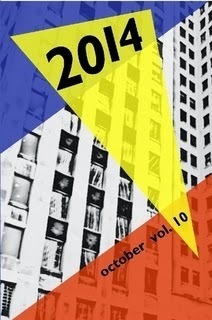 October (print, e-pub,
October (print, e-pub, and for Kindle)This project wasn't my first in print, but it was momentous in every other way, and not necessarily because of my inexperience, although I consider it a central milestone to my growth as a writer--as a person. Working with an editor of Matt Potter's caliber, on a project so broad, so ambitious, and interacting with the other authors, most of which felt to me like superstars--a walk-on wannabe on the stage with f*cking Humphrey Bogart, that was me.
Plus the writing itself, of course. This was my first long project to go to press. Although I consider myself a novelist, everything I've had published has been short; 1K words max, I think. I believe this is a good thing, starting with shorts. I believe proficiency in shorts--good shorts--is key to proficiency in longer works. (Otherwise you end up with those long-winded, never-ending novels full of extraneous detail that take fifteen pages to say what one good paragraph would--and with extra punch. I believe this, wholeheartedly. So I'm not complaining.
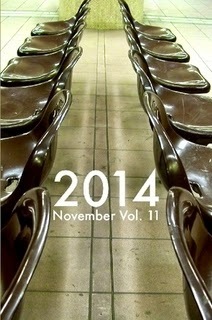 November (print, e-pub,
November (print, e-pub, and for Kindle)When you write shorts, you learn about economy of language. You learn to appreciate--and demand--the exact word; not just the right word, not just a good word: the exact word. You learn how to distinguish between the details that will give life to the story and those that will bog it down into best-forgotten. You learn about arcs--character, story, plot--and you learn how to recognize the tipping points. You learn how to make the most of these points, how to narrow down the narrative focus so they blot out everything, become everything. You learn pretty much everything that has an impact on brilliant narration.
Except how to sustain tension throughout a longer work.
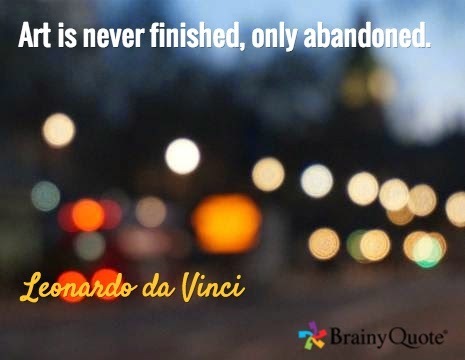 And that's where the challenge was, for me, for the 2014 A Year In Stories project. Twelve stories, max 1.5K each (and believe you me, I used up every word in that allowance every month, even went slightly past it a couple of times); each story needed to stand on its own two feet in terms of arc and plot development, but at the same time the twelve stories together needed to form a single arc spanning the whole year.
And that's where the challenge was, for me, for the 2014 A Year In Stories project. Twelve stories, max 1.5K each (and believe you me, I used up every word in that allowance every month, even went slightly past it a couple of times); each story needed to stand on its own two feet in terms of arc and plot development, but at the same time the twelve stories together needed to form a single arc spanning the whole year.Pfffff.
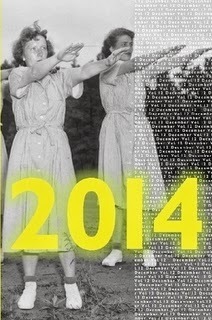 December (print, e-pub,
December (print, e-pub, and for Kindle)Am I satisfied with the result? Yes. Could it have been better? Yes. Of course. And that's another lesson learned here: like Leonardo said, art is never finished--only abandoned. I could've gone on tinkering with the storyline for months. Years.
Thank god for editors.
Bottom-line: this project was the best, the most challenging, of both worlds. It deepened my ability for writing short, punchy fiction. It forced me to think about the long-term (fiction-wise) consequences of each story. It made me deal with the impossibility of tying all those loose threads of narrative into a single arc, the conclusion of which would feel (somewhat) satisfying to the reader. And to me.
Brilliant project. Brilliant.
P.S. -- January through August volumes have a 20% discount.
Published on September 21, 2014 10:11
September 18, 2014
The Meaning of Cuernavaca
The city of memory, the city of nostalgia, of everything that's been lost, and found, forgotten, remembered.
We--my father, my mother, and I--moved from Mexico City to Cuernavaca in December 1975, when I was two months shy of three years old. I have fragmented memories of that December. For instance, walking around the pool wearing corduroy pants and a woolen sweater (yes, winters in the central altiplano of México can be cold), but my parents were wearing swimming suits, and I remember remarking on that, briefly, internally.
 View of the house I grew up in, from the carport. The deep end of the pool is just off-frame to the right.
View of the house I grew up in, from the carport. The deep end of the pool is just off-frame to the right.
In the back you can see half of the sandbox I played in for hours, the tree where I had my treehouse
(long gone, rotted or something, before this photo was made), and a corner of the tennis court
(you have to look hard).
My father made this photo five months before he died.
The mystery didn't last long; when I was most distracted, when I least expected it, they pushed me into the deep end of the pool. Having just moved from an apartment into a 1.5K-square-meter property with a giant, very deep body of water in the center of the manicured landscape, they needed to know that their little girl--their only little girl--could save herself if she fell in unobserved. (The swimsuits were in case I couldn't.)
I did, though. I swallowed some water, I froze half to death (my perception; apparently I wasn't even blue when I came out), and it took me a long, long time to forgive my parents for this, the ultimate betrayal of trust (again, my perception), but I doggie-paddled without any trouble to the stairs leading out from the deep end of the pool and climbed out. All by myself.
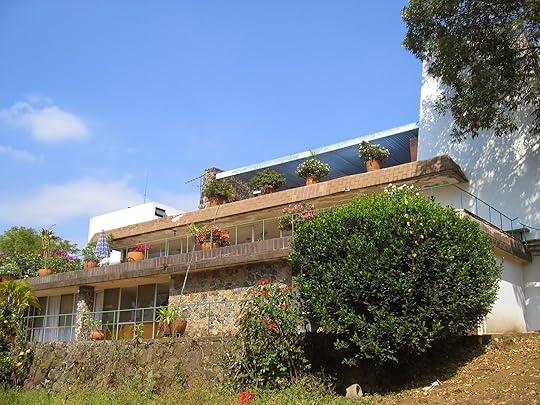 View of the house from the lawn. The previous photo was
View of the house from the lawn. The previous photo was
made from the highest tier, just under the blue carport roof.Yes, I remember that. I remember the feel of the soaked clothes. The water-logged weight of the shoes on my feet. The chill of the slight breeze. How the sun never had felt so useless. Most of all, though, I remember the sense--even though I had no words to define it then--of having grown up a smidgen. Of having done something momentous, if unpleasant. I filed it away, then: growing up comes in bursts, and they're mostly distasteful.
Cuernavaca is that, above all. The scene of those bursts of growing up. Most are painful: the loss of my father, the betrayal of my first love, the end of an entire life of dreams. Some are shameful, others embarrassing, many giggle-worthy (now, in hindsight). I understand why I left, why I needed to leave it all behind--and, now, I understand too why this city exerts such a pull in spite of the two decades I've been away.
Returning to Cuernavaca is the cusp of nostalgia. The childhood I lived in that huge house was a thing of fantasy. The friends I made, the people I loved; they're all there, in unexpected corners. That house is a time machine that pounces, much like my parents that December morning 4 decades ago, when I least expect it. And I've never felt it as strong as I did this time.
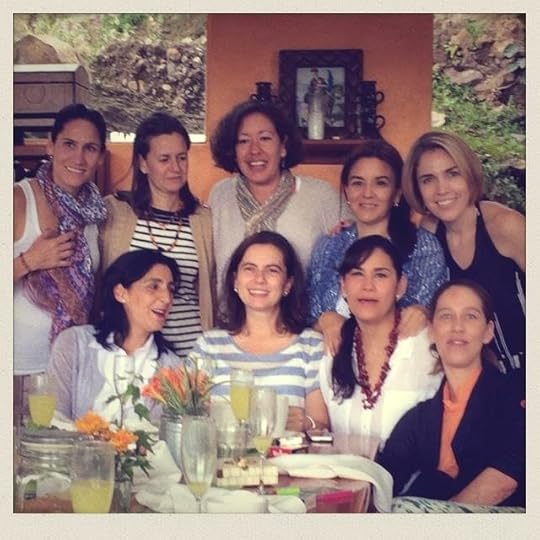 Reunion with high school classmates I hadn't seen in
Reunion with high school classmates I hadn't seen in
twenty years. Yes, TWENTY. Funnily enough, conversation
(and laughter--especially laughter!) flowed like we'd seen
each other just a few months ago. Like time hadn't passed
at all.Maybe it was the reunions I had. Maybe it was the fact that I hadn't been there for three years, the longest I've stayed away since leaving in 1998. Maybe it's the sadness I feel at how Mexico has fallen, what it's become--and is becoming. Maybe it's just the particular moment of my life now; since deciding to write full time, I've been immersed in an introspection of a--perhaps--unnatural intensity. That first novel I'm working on (should be, anyway) is, after all, about Cuernavaca and the denouement of my life there.
Whatever it was, being there was a hard thing. Leaving, though, was even harder. If I didn't have such happiness to come back to in Curaçao I'm not sure I could have gotten on that plane.
Being a writer, I recorded the whole emotional roller-coaster in my journal. It'll be most helpful in the not-too-distant future :)
We--my father, my mother, and I--moved from Mexico City to Cuernavaca in December 1975, when I was two months shy of three years old. I have fragmented memories of that December. For instance, walking around the pool wearing corduroy pants and a woolen sweater (yes, winters in the central altiplano of México can be cold), but my parents were wearing swimming suits, and I remember remarking on that, briefly, internally.
 View of the house I grew up in, from the carport. The deep end of the pool is just off-frame to the right.
View of the house I grew up in, from the carport. The deep end of the pool is just off-frame to the right.In the back you can see half of the sandbox I played in for hours, the tree where I had my treehouse
(long gone, rotted or something, before this photo was made), and a corner of the tennis court
(you have to look hard).
My father made this photo five months before he died.
The mystery didn't last long; when I was most distracted, when I least expected it, they pushed me into the deep end of the pool. Having just moved from an apartment into a 1.5K-square-meter property with a giant, very deep body of water in the center of the manicured landscape, they needed to know that their little girl--their only little girl--could save herself if she fell in unobserved. (The swimsuits were in case I couldn't.)
I did, though. I swallowed some water, I froze half to death (my perception; apparently I wasn't even blue when I came out), and it took me a long, long time to forgive my parents for this, the ultimate betrayal of trust (again, my perception), but I doggie-paddled without any trouble to the stairs leading out from the deep end of the pool and climbed out. All by myself.
 View of the house from the lawn. The previous photo was
View of the house from the lawn. The previous photo was made from the highest tier, just under the blue carport roof.Yes, I remember that. I remember the feel of the soaked clothes. The water-logged weight of the shoes on my feet. The chill of the slight breeze. How the sun never had felt so useless. Most of all, though, I remember the sense--even though I had no words to define it then--of having grown up a smidgen. Of having done something momentous, if unpleasant. I filed it away, then: growing up comes in bursts, and they're mostly distasteful.
Cuernavaca is that, above all. The scene of those bursts of growing up. Most are painful: the loss of my father, the betrayal of my first love, the end of an entire life of dreams. Some are shameful, others embarrassing, many giggle-worthy (now, in hindsight). I understand why I left, why I needed to leave it all behind--and, now, I understand too why this city exerts such a pull in spite of the two decades I've been away.
Returning to Cuernavaca is the cusp of nostalgia. The childhood I lived in that huge house was a thing of fantasy. The friends I made, the people I loved; they're all there, in unexpected corners. That house is a time machine that pounces, much like my parents that December morning 4 decades ago, when I least expect it. And I've never felt it as strong as I did this time.
 Reunion with high school classmates I hadn't seen in
Reunion with high school classmates I hadn't seen intwenty years. Yes, TWENTY. Funnily enough, conversation
(and laughter--especially laughter!) flowed like we'd seen
each other just a few months ago. Like time hadn't passed
at all.Maybe it was the reunions I had. Maybe it was the fact that I hadn't been there for three years, the longest I've stayed away since leaving in 1998. Maybe it's the sadness I feel at how Mexico has fallen, what it's become--and is becoming. Maybe it's just the particular moment of my life now; since deciding to write full time, I've been immersed in an introspection of a--perhaps--unnatural intensity. That first novel I'm working on (should be, anyway) is, after all, about Cuernavaca and the denouement of my life there.
Whatever it was, being there was a hard thing. Leaving, though, was even harder. If I didn't have such happiness to come back to in Curaçao I'm not sure I could have gotten on that plane.
Being a writer, I recorded the whole emotional roller-coaster in my journal. It'll be most helpful in the not-too-distant future :)
Published on September 18, 2014 17:28
September 10, 2014
A brief intro to my life in #Mexico
Visitors to this blog might wonder why Derain's "Bathers" get place of honor on the header of this blog. What do three nude women have to do with Quiet Laughter? For those familiar with fauvism, the connection might seem even more bizarre--or, maybe, not.
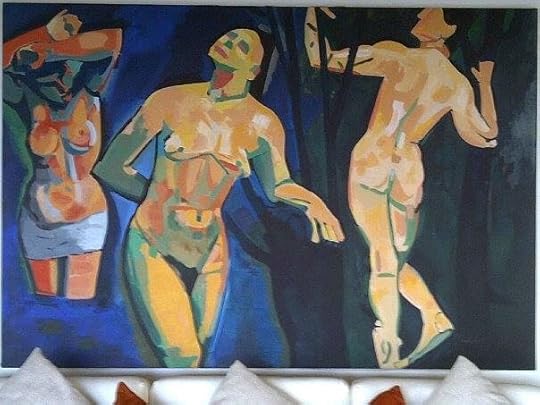 Neither the nude women, or fauvism--or even Derain--is the connection. This is a photo of the living room in the house where I grew up in. I just took it today. That painting--a copy, obviously--has been hanging in that spot for as long as I can remember--and we moved into this house when I was three. That painting--not even the original, but the copy--symbolizes this house for me, and everything in it: the memories, the drama, the fun times, the losses, the safe haven, the letting go. That painting is, at a profoundly personal level, my history.
Neither the nude women, or fauvism--or even Derain--is the connection. This is a photo of the living room in the house where I grew up in. I just took it today. That painting--a copy, obviously--has been hanging in that spot for as long as I can remember--and we moved into this house when I was three. That painting--not even the original, but the copy--symbolizes this house for me, and everything in it: the memories, the drama, the fun times, the losses, the safe haven, the letting go. That painting is, at a profoundly personal level, my history.
One day, it--like me--will have to leave Cuernavaca (Mexico) behind and move to Curaçao.
We'll have to build it a special wall, though.
 Neither the nude women, or fauvism--or even Derain--is the connection. This is a photo of the living room in the house where I grew up in. I just took it today. That painting--a copy, obviously--has been hanging in that spot for as long as I can remember--and we moved into this house when I was three. That painting--not even the original, but the copy--symbolizes this house for me, and everything in it: the memories, the drama, the fun times, the losses, the safe haven, the letting go. That painting is, at a profoundly personal level, my history.
Neither the nude women, or fauvism--or even Derain--is the connection. This is a photo of the living room in the house where I grew up in. I just took it today. That painting--a copy, obviously--has been hanging in that spot for as long as I can remember--and we moved into this house when I was three. That painting--not even the original, but the copy--symbolizes this house for me, and everything in it: the memories, the drama, the fun times, the losses, the safe haven, the letting go. That painting is, at a profoundly personal level, my history.One day, it--like me--will have to leave Cuernavaca (Mexico) behind and move to Curaçao.
We'll have to build it a special wall, though.
Published on September 10, 2014 16:29
August 28, 2014
The House of Six Doors (a novel about Curaçao)
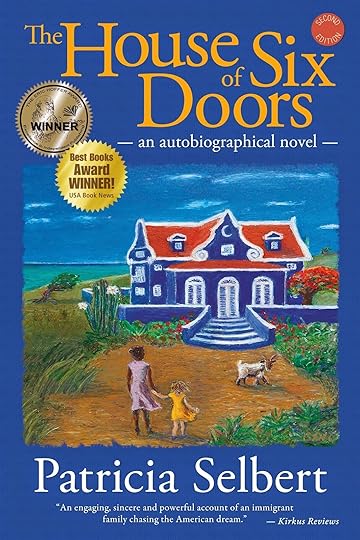 For eleven years, ever since I came--by accident--to live in Curaçao, I've been looking for books about this island's rich history and people. And for eleven years I found nothing. There's plenty in Dutch or Papiamentu, neither of which I read, and even if I did, most of it is non-fiction, drab and clinical, that doesn't come close to doing this magical, surreal place justice.
For eleven years, ever since I came--by accident--to live in Curaçao, I've been looking for books about this island's rich history and people. And for eleven years I found nothing. There's plenty in Dutch or Papiamentu, neither of which I read, and even if I did, most of it is non-fiction, drab and clinical, that doesn't come close to doing this magical, surreal place justice.And then I found Patricia Selbert's House of Six Doors. The book has flaws--it is, after all, a debut novel--but richness of setting isn't one of them. Neither is emotional charge, which comes across clear and sharp, without drama, without falling into maudlin o-woe-is-me. I teared up twice, the second time uncontrollably (yeah, near the end). But I laughed, too.
And I learned so much about this place I've called home for over a decade.
Patricia's knack for narrative touches a nerve at the same time ubiquitous in today's world and, strangely, seldom mentioned: the multicultural personality. In our current, globalized, reality, multiculturalism is the new normal--mixed-race families, migration, children growing up in cultures diametrically different than their parents', the cultural exchange that border-breaching technology makes possible. And yet we continue to focus on "race"--skin color, place of birth--to define each other, and ourselves. And we continue to ignore the impact of culture--especially multiculture.
Serena, the book's protagonist and narrator, is light-skinned, which, in skin-color-über-sensitive Curaçao, awards her a special place in society. She's the one child that gets taken to visit her father's family on Sundays--but this family, Netherlands-born Dutch, reject her with cruel pettiness. Her mother, see, comes from a mixed-race family: Arawak native, black slave, Portuguese. Serena's life revolves around Oma, her maternal grandmother: a tall, sculptural black woman with eyes that shine like a meteor shower in the night sky. When Serena's mother takes her and her sister to the US, in search of the American Dream, it's Oma that Serena misses above all. She finds little to like in this new country, so hostile to the three women--but it is here, amidst tragedy, poverty, and heartbreak, that she discovers not only herself, but the depth and breadth of her cultural--multicultural--roots.
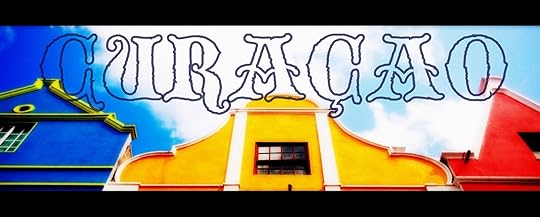
This is a story that will resonate with every immigrant, whether from Curaçao or Timbuktu. It has everything: a mother-daughter relationship that crackles with tension and betrayal, a yearning for what was--the childhood we've all lost, a discovery of what it means to grow up and let go, and--perhaps above all--the realization that nothing, and no one, we love is ever truly lost. It's a beautiful, beautiful book.
Published on August 28, 2014 08:47
August 24, 2014
Loss
Tina Downey, of Life Is Good, passed away last night. I knew her briefly, intermittently, but I always enjoyed her posts. Her family have posted a goodbye of sorts on her blog; if you can, stop by and leave a verbal handful of rose petals.
Much light to you, Tina, wherever you are. And thank you. For everything.
Much light to you, Tina, wherever you are. And thank you. For everything.
Published on August 24, 2014 13:23



